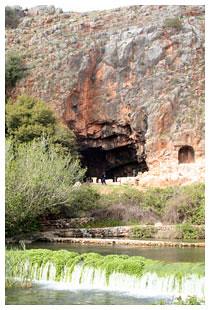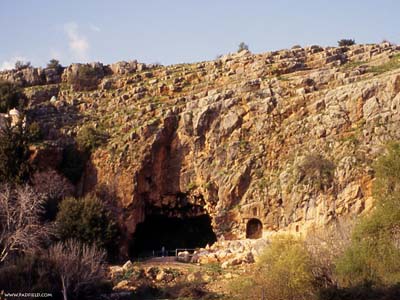Upon this Rock I will build my Congress
From SaveTheWorld - a project of The Partnership Machine, Inc. (Sponsor: Family Music Center)
| Forum (Articles) | Offer | Partners | Rules | Tips | FAQ | Begin! | Donate |
This article was started by Dave Leach R-IA Bible Lover-musician-grandpa (talk) 22:13, 16 February 2020 (UTC). Interaction from other writers will be distinguished from my writing with horizontal lines above and below. Your response to anything you read here is most welcome. Please add your response next to what you are responding to. If your reaction is not to any specific part of this article, please add general comments on the "Discussion" page. To read the original version of this article in a .pdf document, see www.Saltshaker.US/Salt/UponThisRockIwillbuildmyCongress.pdf.
Part One: the Original Gates of Hell
They weren’t supposed to go there. Not Jews. Not there.
It was bad enough heading South to Samaria. But North, to this place?
This place where so many pagan temples were built into a cliff that it was called the “Rock of the gods”? These cruel “gods” with their orgies with children, slaves, goats, and babies left to die?
By the early first century, Caesarea Philippi (named in 2 AD by Herod Philip in honor of Caesar Augustus) was reviled by orthodox rabbis, and it was taught that no good Jew would ever visit there.
In the center of the Rock of the Gods is a huge cave, from which a stream flowed (after 19th century earthquakes, the stream began flowing out from the rock beneath the mouth of the cave). ... In the open-air Pan Shrine, next to the cave mouth, there was a large niche, in which a statue of Pan (a half-goat, half-human creature) stood, with a large erect phallus, worshipped for its fertility properties. Surrounding him in the wall were many smaller niches, in which were statues of his attending nymphs. On the shrine in front of these niches, worshippers of Pan would congregate and partake in bizarre sexual rites, including copulation with goats – worshipped for their relationship to Pan. - (“Why context is important – the lesson of Caesarea Philippi”
It wasn’t just disgusting. It was dangerous. Mobs which trust myths can become violently intolerant of “fanatics” who do not. Especially fanatics who talk.
But there he stood. Surrounded by his trembling disciples. Talking.
Right there in Caesarea Phillipi, within sight of the cave called “The Gates of Hell”, in the bloody cliff that was devoted to the “god” Pan.
Bible Commentator Jamieson-Faussett-Brown: Caesarea Philippi — It lay at the foot of Mount Lebanon, near the sources of the Jordan, in the territory of Dan, and at the northeast extremity of Palestine. It was originally called Panium (from a cavern in its neighborhood dedicated to the god Pan) and Paneas.
Word of God Today: Herod Phillip, one of the sons of Herod the Great, ruled the area of Gaulanitis on the east side of the Jordan River. He made ancient Paneas his capital city and renamed it after Caesar Augustus. To distinguish it from the Caesarea on the Mediterranean coast it was named Caesarea Philippi. Much later, in the seventh century AD the Arabs captured the city and it reverted to its old name. Because of their difficulty in pronouncing the “P” sound, the name of the city became simply Banias as it still is today.
The cave was called “the Gates of Hell” because a spring exited the cave, and the foolish Greeks thought underground springs were portals to Hell; besides, this spring was so deep that the gullible Greeks imagined it reaching all the way down to Hell.
(Right after Peter’s confession and Jesus’ rebuke of him for arguing against accepting the Cost Jesus was preparing to pay) Then he called the crowd to him along with his disciples and said: “If anyone would come after me, he must deny himself and take up his cross and follow me. For whoever wants to save his life will lose it, but whoever loses his life for me and for the gospel will save it. What good is it for a man to gain the whole world, yet forfeit his soul? Or what can a man give in exchange for his soul? If anyone is ashamed of me and my words in this adulterous and sinful generation, the Son of Man will be ashamed of him when he comes in his Father’s glory with the holy angels.” (Mark 8:34-38)
This begs a few questions: What crowd did He call to him? Could it have been the Pan worshippers? Any crowd from this region would NOT have been religiously Jewish. Was the last statement aimed at his disciples, who might have been embarrassed at the spectacle Jesus was creating? FishingTheAbyss

